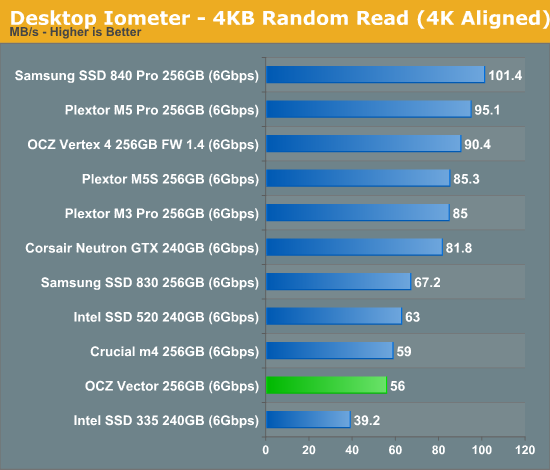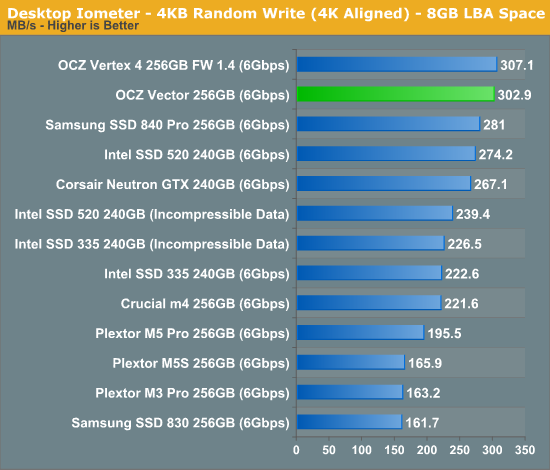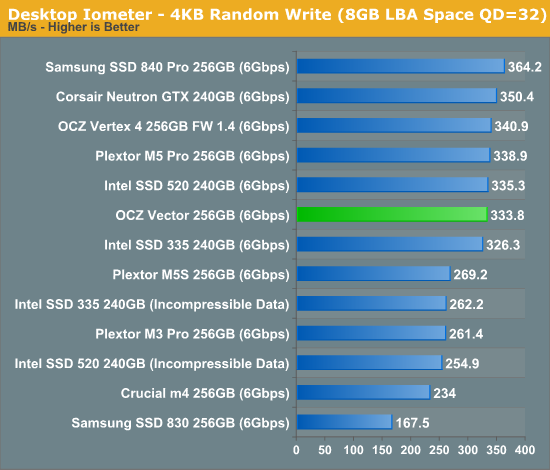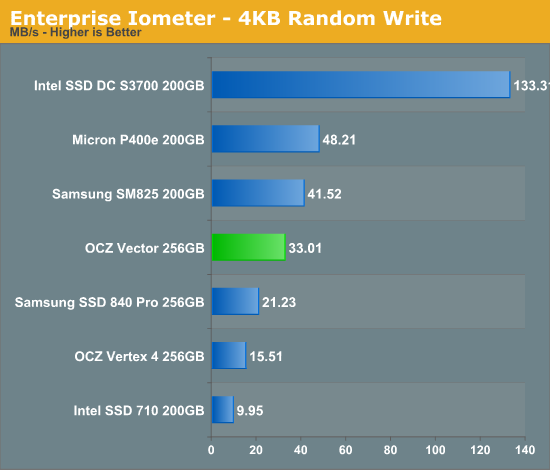OCZ Vector (256GB) Review
by Anand Lal Shimpi on November 27, 2012 9:10 PM ESTRandom Read/Write Speed
The four corners of SSD performance are as follows: random read, random write, sequential read and sequential write speed. Random accesses are generally small in size, while sequential accesses tend to be larger and thus we have the four Iometer tests we use in all of our reviews.
Our first test writes 4KB in a completely random pattern over an 8GB space of the drive to simulate the sort of random access that you'd see on an OS drive (even this is more stressful than a normal desktop user would see). I perform three concurrent IOs and run the test for 3 minutes. The results reported are in average MB/s over the entire time. We use both standard pseudo randomly generated data for each write as well as fully random data to show you both the maximum and minimum performance offered by SandForce based drives in these tests. The average performance of SF drives will likely be somewhere in between the two values for each drive you see in the graphs. For an understanding of why this matters, read our original SandForce article.

Low queue depth random read performance sees a significant regression compared to the Vertex 4. OCZ derives the Vector's specs at a queue depth of 32, at which it'll push 373MB/s of 4KB random reads. As Intel has established in the past, low queue depth random read performance of around 40 - 50MB/s is sufficient for most client workloads as we'll soon see in our trace based storage bench suite.

Low queue depth random write performance is a very different story, here the Vector pretty much equals the Vertex 4's already excellent score.
Many of you have asked for random write performance at higher queue depths. What I have below is our 4KB random write test performed at a queue depth of 32 instead of 3. While the vast majority of desktop usage models experience queue depths of 0 - 5, higher depths are possible in heavy I/O (and multi-user) workloads:

Crank up the queue depth and the Vector does well, but Samsung's SSD 840 Pro manages a nearly 10% performance advantage here.
Steady State 4KB Random Write Performance
OCZ will surely derive enterprise versions of the Vector and its Barefoot 3 controller, but I was curious to see what steady state 4KB random write performance looked like on the drive. I grabbed some of our Enterprise Iometer results from the S3700 review and trimmed out the non-SATA drives. The results are hugely improved compared to the Vertex 4:

Keep in mind this isn't an enterprise drive, and thus it's not too surprising to see significantly higher numbers here from other enterprise drives but the improvement over the Vertex 4 is substantial. Note that Samsung's SSD 840 Pro lands somewhere in between the Vector and Vertex 4.










151 Comments
View All Comments
Sabresiberian - Tuesday, November 27, 2012 - link
So, a longer warranty is only good if you use it? Otherwise you're paying for something you don't need?And, you're paying extra for a 5-year warranty here? What, so all these top end SSDs, whose prices are lower than ever, are in fact over-priced with fake expensive warranties, so should come out with 1-year warranties and lower prices?
coder543 - Tuesday, November 27, 2012 - link
a refurbished SSD? I'm not even sure what that means. That's like going to McDonald's and getting a refurbished McFlurry. It doesn't even make sense.This isn't a laptop, where worn parts can be replaced. This is a limited lifespan, consumable product, where replacing any parts is equivalent to throwing the old one away and pulling out a brand new one. If the warranty actually says this, then please, point me to it, but otherwise, I'm gonna have to call this bluff and say it's not practical.
Beenthere - Wednesday, November 28, 2012 - link
The point that some of you seem to not understand is that the 5 year warranty does NOT mean that an SSD or other product is any better quality than a product with a one year warranty. And yes you are paying for the extended warranty no matter what the current price. SSD prices are dropping as cost to produce them is dropping. This particular OCZ model is not a highend model by any stretch, it's just the SSD-of-the-week to be superceded by a new model in a month or two.Refurbished can mean hand soldered chip replacement or other poorly executed repairs that would not be acceptable to most technically knowledgeable consumers. Reconditioned can mean it's been laying in the warehouse collecting dust for six months and nothing was actually done to repair it when it was returned defective. You would not believe some of the crap that ships as replacement warranty products.
zero2dash - Wednesday, November 28, 2012 - link
^^^ I'm with Beenthere.A 5 year warranty means a 5 year warranty; nothing more nothing less. The notion that '5 year warranty = great product!' is asinine.
I think if you want to assume anything based off a 5 year warranty in this case, it's because the product is new, the controller is relatively new, and it's an OCZ SSD product.
I'm not likely to buy an OCZ SSD anytime soon, but I'd definitely rather buy one with a 5 year warranty than a 1 or 3 year warranty....if I have to buy an OCZ branded SSD because every other brand is sold out.
I owned a 30GB Vertex. For 9 months, it was great. Then it turned into a big POS. Constant chkdsk errors. I did a sanitary erase/firmware flash and sold it for what I could get for it.
melgross - Wednesday, November 28, 2012 - link
I certainly would not want a refurbished SSD. It would NOT mean new NAND chips, which are the parts most likely to be a problem. Or a new controller. I would never buy a refurbished HDD either. These devices do have lifetimes. Since you have no idea how these drives have been used, or abused, you are taking a very big chance for the dubious opportunity of saving a few bucks.Hood6558 - Wednesday, November 28, 2012 - link
I can't help but wonder how many replacement SSDs it will take to get to the end of that 5 year warranty. If you go by the track record of Vertex 3 & 4, you can expect a failure about every 90 days, so that's 20 drives, less shipping time to and from, so call it 15 drives with a total downtime of 1.25 years. Wow!.. where can I get one? My Vertex 4 lasted 15 days, but I'm sure that was just a fluke...melgross - Wednesday, November 28, 2012 - link
I basically agree. From anecdotal reports, OCZ is one of the least reliable vendors, with their drives less reliable than the average HDD. While, so far, the average SSD reliability being about the same as the average HDD, despite people's expectations, this isn't good.Most people don't need the really high speeds a few of these drives support, higher reliability would be a much better spec to have. Unfortunately, these reviews can't indicate how reliable these drives will be in the longer term.
While I see that OCZ seems to be thought of as failing, this is the first I've heard of it. Have their sales collapsed of late? I was surprised to find that their long time CEO whom Anand had communicated so often with in the past is gone.
Spunjji - Wednesday, November 28, 2012 - link
"FYI- A five year warranty ain't worth the paper it's written on if the company no longer exists." <- Depends on how you purchase it. Credit card companies will often honour warranties on products purchased from defunct companies. YMMV."Most state that you will receive a refurbished or reconditioned replacement if your product develops a defect." <- Happily now everyone in the thread after you has used this conjecture to knock OCZ warranties. That's not really your fault, but I don't think anyone here has read the terms of OCZ's warranty on this product yet?
The point being made here is that OCZ would not offer a 5 year warranty on the product if they thought the cost of honouring that warranty would eclipse their income from sales. This is why 1-year warranties are a red flag. So *something* can be inferred from it; just only about the manufacturer's confidence in their product. You can read into that whatever you want, but I don't generally find that companies plan to be out of business within their warranty period.
Your comment about it increasing the price of the product is odd, because this product is the same price and specification as models with shorter warranties. So either a) you're wrong, or b) you're trivially correct.
JonnyDough - Friday, November 30, 2012 - link
Here here. I second that. I am so tired of getting worn refurbished parts for things I just bought BRAND NEW. CoolerMaster just did this for a higher end power supply I bought. Why would I want to spend a hundred dollars for a used PSU? Seriously. Now all the components aren't new in it. Once the warranty expires it'll die right away. Where is the support behind products these days?It used to be that buying American meant you got quality and customer service. Gone are those days I guess, since all the corporations out there are about to start actually paying taxes.
smalM - Tuesday, November 27, 2012 - link
(e.g. a 256GB Vector appears formatted as a 238GB drive in Windows).Oh please Anand, the old "formatted" nonsens of all people from you?
You really should drop this sentence from your phrase list....